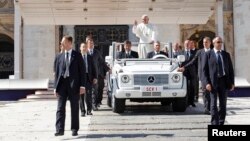VATICAN CITY —
Cardinals advising Pope Francis on how to reform the Vatican believe the Holy See's central government is so problem-ridden that only a total overhaul can fix it, the Vatican said on Thursday.
The unusually stark acknowledgement came on the third and final day of closed-door meetings between the pope and eight cardinals from around the world who are discussing the Vatican's troubled administration and mapping out possible changes in the worldwide Church.
Vatican spokesman Father Federico Lombardi said the cardinals no longer were considering adjustments or changes to a 1998 constitution on the workings of the Vatican's various departments, known as “Pastor Bonus” [Good Shepherd].
"[The cardinals] are leaning toward a constitution with very significant new elements; in short, a new constitution," Lombardi told reporters at a briefing.
The Vatican's central administration, known as the Curia, has been accused of being dysfunctional and riven with infighting and was largely blamed for many of the mishaps and scandals that plagued the papacy of Benedict XVI, who resigned in February.
Bishops around the world have deemed it heavy-handed, autocratic, condescending and overly bureaucratic, and some say it sometimes seemed to have taken on the trappings and intrigue of a Renaissance court.
Francis said in an interview published Tuesday in an Italian newspaper that one main problem of the Curia was that it was too focused on its own interests and too inward looking. He said a court atmosphere where Vatican officials act like “courtiers” was “the leprosy of the papacy."
New style
Francis has brought a new style of openness, consultation and simplicity to the Vatican. He has shunned the spacious papal apartment and lives in small quarters in a guest house.
He announced the papal advisory board of cardinals, a revolutionary step for a Church steeped in hierarchical tradition, a mere month after his election as the first non-European pope in 1,300 years and the first from Latin America.
His decision to take advice from the cardinals - from Italy, Chile, India, Germany, Democratic Republic of Congo, the United States, Australia and Honduras - is a clear sign that he intends to take seriously calls from within the Church to decentralize a traditionally top-heavy institution.
Before resigning, Benedict left a secret report for Francis on the problems of the Curia, which were exposed when sensitive documents alleging corruption were stolen from Benedict's desk by his butler and leaked to the media.
There have been suggestions that some Vatican departments should be merged and others closed in order to make the Curia more efficient and to prevent corruption.
However, writing a new Vatican constitution to replace "Pastor Bonus," which runs to nine sections, 193 articles and two appendices, will be a major task, and Lombardi said it was unclear how long it would take.
The spokesman said the cardinals felt the role of the Curia should be to serve the 1.2 billion member Roman Catholic Church "rather than the exercise of centralized power."
The unusually stark acknowledgement came on the third and final day of closed-door meetings between the pope and eight cardinals from around the world who are discussing the Vatican's troubled administration and mapping out possible changes in the worldwide Church.
Vatican spokesman Father Federico Lombardi said the cardinals no longer were considering adjustments or changes to a 1998 constitution on the workings of the Vatican's various departments, known as “Pastor Bonus” [Good Shepherd].
"[The cardinals] are leaning toward a constitution with very significant new elements; in short, a new constitution," Lombardi told reporters at a briefing.
The Vatican's central administration, known as the Curia, has been accused of being dysfunctional and riven with infighting and was largely blamed for many of the mishaps and scandals that plagued the papacy of Benedict XVI, who resigned in February.
Bishops around the world have deemed it heavy-handed, autocratic, condescending and overly bureaucratic, and some say it sometimes seemed to have taken on the trappings and intrigue of a Renaissance court.
Francis said in an interview published Tuesday in an Italian newspaper that one main problem of the Curia was that it was too focused on its own interests and too inward looking. He said a court atmosphere where Vatican officials act like “courtiers” was “the leprosy of the papacy."
New style
Francis has brought a new style of openness, consultation and simplicity to the Vatican. He has shunned the spacious papal apartment and lives in small quarters in a guest house.
He announced the papal advisory board of cardinals, a revolutionary step for a Church steeped in hierarchical tradition, a mere month after his election as the first non-European pope in 1,300 years and the first from Latin America.
His decision to take advice from the cardinals - from Italy, Chile, India, Germany, Democratic Republic of Congo, the United States, Australia and Honduras - is a clear sign that he intends to take seriously calls from within the Church to decentralize a traditionally top-heavy institution.
Before resigning, Benedict left a secret report for Francis on the problems of the Curia, which were exposed when sensitive documents alleging corruption were stolen from Benedict's desk by his butler and leaked to the media.
There have been suggestions that some Vatican departments should be merged and others closed in order to make the Curia more efficient and to prevent corruption.
However, writing a new Vatican constitution to replace "Pastor Bonus," which runs to nine sections, 193 articles and two appendices, will be a major task, and Lombardi said it was unclear how long it would take.
The spokesman said the cardinals felt the role of the Curia should be to serve the 1.2 billion member Roman Catholic Church "rather than the exercise of centralized power."





